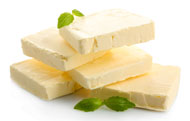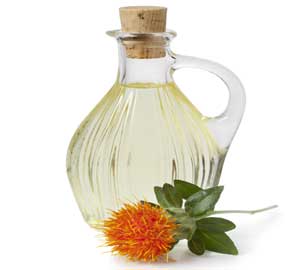




Safflower Oil -
is a good source of

1. Safflower Oil Facts
2. Tips for Cooking and Storage
3. Types of Safflower Oil
4. Safflower Oil Nutritional Value
5. Safflower Oil Health Benefits
Safflower Oil Facts
History and Origin
Types of Safflower Oil
Common Types of Safflower Oil
Safflower Oil Nutritional Value
Safflower Oil ( Nutritional value )
Nutritional Value per 13.6 g – 1 Tablespoon
Oil, safflower, salad or cooking, linoleic, (over 70%)
|
Nutrient ( Proximate’s )
|
Unit
|
Value
|
Daily Value %
|
|
Energy
|
kcal
|
120
|
6%
|
|
Protein
|
g
|
0.00
|
|
|
Total lipid (fat)
|
g
|
13.60
|
20.9%
|
|
Carbohydrate, by difference
|
g
|
0.00
|
|
|
Fiber, total dietary
|
g
|
0.0
|
|
|
Total Sugars
|
g
|
0.00
|
|
|
Minerals
|
|||
|
Calcium, Ca
|
mg
|
0
|
|
|
Iron, Fe
|
mg
|
0.00
|
|
|
Magnesium, Mg
|
mg
|
0
|
|
|
Phosphorus, P
|
mg
|
0
|
|
|
Potassium, K
|
mg
|
0
|
|
|
Sodium, Na
|
mg
|
0
|
|
|
Zinc, Zn
|
mg
|
0.00
|
|
|
Copper, Cu
|
mg
|
0.000
|
|
|
Selenium, Se
|
µg
|
0.0
|
|
|
Vitamins
|
|||
|
Vitamin C, total ascorbic acid
|
mg
|
0.0
|
|
|
Thiamin (B-1)
|
mg
|
0.000
|
|
|
Riboflavin (B-2)
|
mg
|
0.000
|
|
|
Niacin (B-3)
|
mg
|
0.000
|
|
|
Pantothenic acid (B-5)
|
mg
|
0.000
|
|
|
Vitamin (B-6)
|
mg
|
0.000
|
|
|
Folate (B-9)
|
µg
|
0
|
|
|
Vitamin (B-12)
|
µg
|
0.00
|
|
|
Vitamin A, IU
|
IU
|
0
|
|
|
Vitamin E (alpha-tocopherol)
|
mg
|
4.64
|
15.4%
|
|
Vitamin K (phylloquinone)
|
µg
|
1.0
|
1.2%
|
|
Lipids
|
|||
|
Saturated Fatty Acids
|
g
|
0.844
|
4.2%
|
|
Monounsaturated Fatty Acids
|
g
|
1.952
|
|
|
Polyunsaturated Fatty Acids
|
g
|
10.149
|
|
|
Cholesterol
|
mg
|
0
|
|

|
Reference Values are based on a 2,000 Calorie Intake, for Adults and Children 4 or More Years of Age. Your daily values may be higher or lower depending on your calorie needs.
|
|
Percentages are roughly approximated using (RDA) Recommended Dietary Allowances for adults. Source: USDA United States Department of Agriculture
|
|
Reference Values for Nutrition – National Institutes of Health USA
|
Safflower Oil Nutritional Value
Safflower Oil Health Benefits
Safflower Oil

HEALTH
References
|
Nutrient Database – USDA (United States Department of Agriculture)
|
|
Reference Values for Nutrition – National Institutes of Health USA
|
